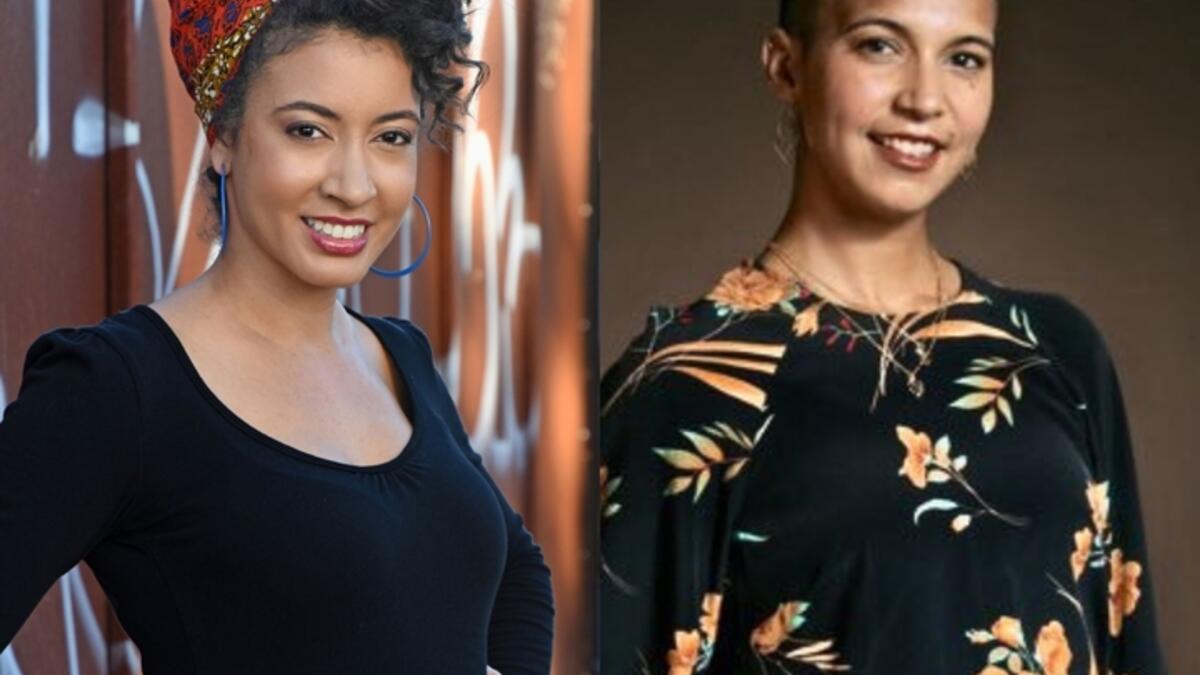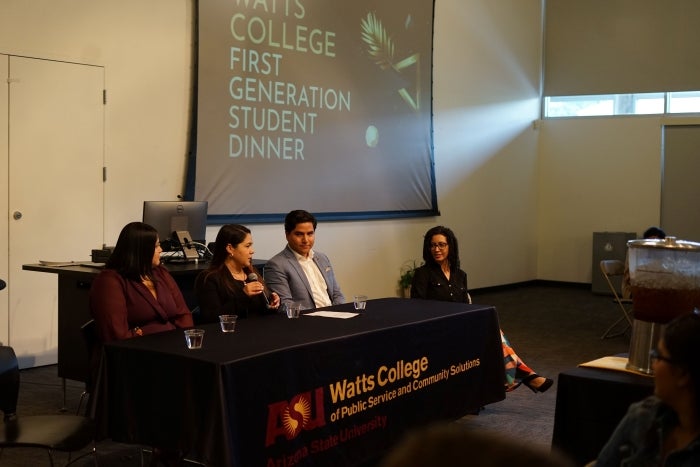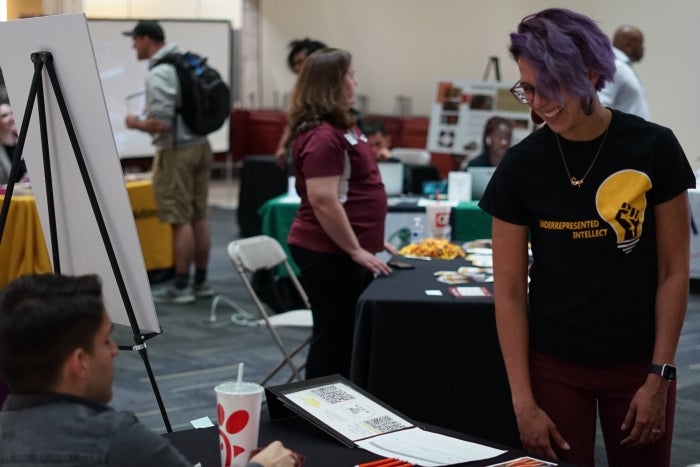2 from Watts College among 4 presented with Faculty Women of Color Caucus Awards

Watts College Associate Dean Chandra Crudup (left) and social work doctoral student Cynthia Mackey received two of four awards presented by the ASU Faculty Women of Color Caucus.
The Arizona State University Faculty Women of Color Caucus, or FWOCC, recently presented two of its four annual awards to members of the Watts College of Public Service and Community Solutions for their efforts to advance inclusive excellence.
FWOCC President Jackie Martinez presented Chandra Crudup, Watts College associate dean for inclusive design and equity access (IDEA) and an associate professor in the School of Social Work, with the organization’s inaugural Outstanding Leadership Award.
Martinez, faculty head of languages and cultures at the College of Integrative Sciences and Arts, bestowed the Outstanding Doctoral Student Award on Cynthia Mackey, who is pursuing a doctoral degree in social work and expects to graduate in May 2025.
Watts College Dean and President’s Professor Cynthia Lietz said the FWOCC’s recognition of Crudup and Mackey at the April ceremony honors their dedication to the work of fostering inclusion for all.
“Our IDEA Office, created and led by Dr. Chandra Crudup, is a model for embedding this work into all we do,” Lietz said. ”And Cynthia Mackey serves as an IDEA Scholar and is an emerging leader in this area. This recognition is well deserved!”
‘She does this work for a greater purpose’
Crudup was nominated for her award by Vanessa Fonseca-Chavez, an associate professor of English and a College of Integrative Sciences and Arts associate dean of diversity, equity and inclusion. She described Crudup as “a kind and thoughtful leader who takes a lot of pride in the work that she does, except that she does this work for a greater purpose, which is to advocate for those who do not have the same access to the institution as others.”
Fonseca-Chavez pointed to Crudup’s leadership in creating a space for career-track faculty in FWOCC, making sure they were included in discussions within the organization, as an illustration of this trait.
“She led an effort to focus on how white supremacy affected our most vulnerable faculty in the classroom, and she ensured that their voices were included in the conversations,” Fonseca-Chavez wrote.
Fonseca-Chavez also wrote that Crudup’s post as associate dean made it “incredible to watch and hear about how she skillfully negotiated her role and ensured that there were opportunities to thrive extended to her and to the larger community at Watts.”
Crudup is also interim director of the ASU Studio for Creativity, Place and Equitable Communities.
Crudup said she accepted her award “in honor and acknowledgment of the many women of color leaders — past, present and future — who are pushing the needle every day, as they live, work and breathe within systems not designed for them.”
These leaders “are reimaging change in both formal and informal roles; collectively taking, carrying and passing the baton forward; creating inclusive spaces so that all might have the opportunity to thrive,” Crudup said. “Accepting a formal leadership role comes with great responsibility, and I take that responsibility seriously. I am grateful to work alongside a community in the Watts College and beyond that is committed to leading anti-racist and anti-oppressive practices not just in what we say, but in what we do.”
‘An enduring commitment’
Mackey was nominated for her award by Kelly Jackson, an associate professor of social work, who wrote that Mackey “demonstrates an enduring commitment and leadership efforts to reduce health disparities and improve health-care outcomes for Black and African American communities, especially Black women, here in the Valley.”
Jackson noted that Mackey is one of the first doctoral students in social work to receive the prestigious Council on Social Work Education Minority Fellowship.
“She also has taken on multiple leadership roles within Watts College to help support racially marginalized students through her graduate assistantship within the (IDEA) office, including creating and chairing the annual Celebrating Black Brilliance event,” Jackson wrote. The event is held on the Downtown Phoenix campus.
In addition, Mackey is also former president of the graduate student group Inclusive and Multicultural Association of Social Work Scholars, “which uniquely creates a supportive space for both PhD students and faculty of color in the School of Social Work,” Jackson wrote.
Mackey said she was grateful for the acknowledgement of her work and credited members of her support community for contributing to her success. She dedicated the award to them.
“As a doctoral student, community is with me through mentorship from my fabulous chair and committee mentors and the relationships I have established in community, as I seek to advocate for more culturally responsive and reflexive research tailored to meet the mental health needs of Black women who have experienced incarceration,” Mackey said.
“As an instructor, my students and I create community as we co-develop our classroom and assignments to meet their learning needs and practice anti-racist and anti-oppressive practice in action. Community is always with us at the (IDEA) Office, where I am supported by a team of truly remarkable peers and mentors.”
A College of Integrative Sciences and Arts professor and a master’s student in The College of Liberal Arts and Sciences received the other two FWOCC awards:
- Alisia Tran, College of Integrative Sciences and Arts associate professor of counseling and counseling psychology, received the Outstanding Faculty Peer Mentor Award.
- Angelyn Soto of the School of Transborder Studies received the Outstanding Master’s Student Award.
More University news

ASU PD, international students help keep campus safe through revived program
With four campuses spread across metro Phoenix and an in-person student population exceeding 78,000, the Arizona State University…

ASU 1 of 21 R1 universities recognized in new Carnegie classification for student access and earnings
It is a headline that could have been missed in the blur of daily news about American higher education: The Carnegie Foundation…

The power of purpose: ASU scholarships emphasize service to community
It was the 1970s.A young Jim Armstrong was what he calls a “hippie.”Like many hippies of his generation, he decided to hit the…



